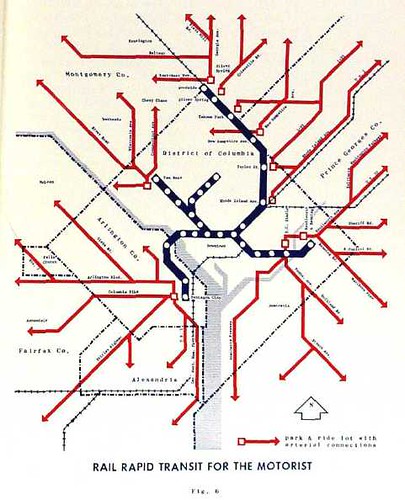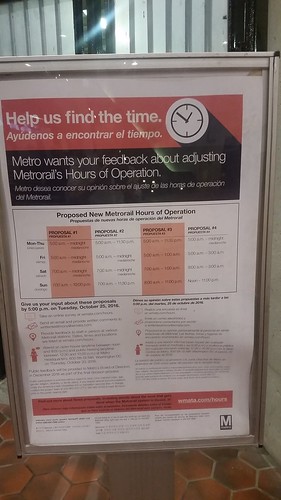Plans for Metrorail contraction in the face of London Night Tube expansion
Discussion of WMATA's proposals to cut back on Metrorail's operating hours is interesting because of how world class transit systems like the London Underground subway are expanding weekend overnight service at the same time ("Night Tube service a 'great success' after opening weekend attracts more than 100,000 passengers" and "The Night Tube brings fun and economic gain," London Evening Standard; and "What impact has the Night Tube had on Stratford," Newham Recorder).
Or how in the face of special events like Major League Baseball playoffs, WMATA is not planning to extend service to accommodate ballgame attendees ("Without late Metro, Nats' first World Series could get embarrassing," Washington Post) while the TTC and GO commuter rail in Toronto extended overnight service to accommodate the city Nuit Blanche program ("Extended GO, TTC hours and road closures in effect for Nuit Blanche," CTV News) and the South Shore commuter rail in Chicago is adding late night service for Cubs playoff games ("South Shore adds train for Cubs' night playoff games," AP). ... SF Giants playoff games don't need special services, at least within San Francisco, because the MUNI system already provides overnight service.

Mayor Siddiq Khan riding the first Night Tube train, holding a copy of the London Evening Standard.
This past Friday, Night Tube service was extended to a third line ("Jubilee line Night Tube service starts this Friday," London Evening Standard) and plans are to extend service to additional lines later this fall and next year.
Interestingly, WMATA is not treating the service reduction proposals as a formal "docketed" process. Maybe because it doesn't involve fares, they can get away with avoiding the process they use normally, which involves multiple public hearings.
They are seeking input through a variety of methods, and have set a deadline of 5:00 p.m. on Tuesday October 25th to respond. Public feedback will be provided to Metro's Board of Directors in December 2016 as part of the final decision process.
-- Email written comments to writtentestimony@wmata.com
-- Provide feedback to staff in person at various Metrorail stations. Click for a list of dates, stations and times
-- Attend an open house on Thursday, October 20, 2016 (anytime between noon and 9:00 p.m.) and public hearing (anytime between 12:30 and 10:00 p.m.) at Metro Headquarters, 600 5th St NW, Washington DC
 An early graphic showing options for the Metrorail system.
An early graphic showing options for the Metrorail system.DC Council is likely to pass a resolution opposing cutbacks in late night service on weekends ("Political Pressure Builds On Metro To Bring Back Late-Night Service," WAMU/NPR) because of the impact on night life and worker mobility needs ("This hurts': DC restaurants brace for work on Metro," Washington Post).
Reductions in weekend service, late night and on Sundays. I don't think I like any of WMATA's service hour reduction proposals.
The proposals, cutting back late night service on Friday and Saturday, and severely cutting back on Sunday hours, both early and late, support all the various criticisms in the past--criticisms that previously I rejected--that WMATA's primary interest is providing service to commuters Monday through Friday, rather than providing the foundational transit services that support adoption of a sustainable mobility platform and lifestyle.
Yes, commuter service was why Metrorail was created, but because of there being so many Metrorail stations in the core of Washington, the city has been able to develop a different, more monocentric, service profile despite the original intentions.

Previous late hours Metrorail service profile
Mon-Thu: 5:00 a.m. - midnight
Fri: 5:00 a.m. - 3:00 a.m.
Sat: 7:00 a.m. - 3:00 a.m.
Sun: 7:00 a.m. - midnight
WMATA has put forward four different options for reductions in service:
Proposal # 1
Mon-Thu: 5:00 a.m. - midnight
Fri: 5:00 a.m. - midnight
Sat: 7:00 a.m. - midnight
Sun: 7:00 a.m. - 10:00 p.m.
Proposal # 2
Mon-Thu: 5:00 a.m. - 11:30 p.m.
Fri: 5:00 a.m. - midnight
Sat: 7:00 a.m. - midnight
Sun: 7:00 a.m. - 11:30 p.m.
Proposal # 3
Mon-Thu: 5:00 a.m. - 11:30 p.m.
Fri: 5:00 a.m. - 1:00 a.m.
Sat: 7:00 a.m. - 1:00 a.m.
Sun: 8:00 a.m. - 11:00 p.m.
Proposal # 4
Mon-Thu: 5:00 a.m. - midnight
Fri: 5:00 a.m. - 3:00 a.m.
Sat: 9:00 a.m. - 3:00 a.m.
Sun: Noon - 11:00 p.m.

Map of proposed overnight bus service expansion. WMATA.
Moving towards an overnight transit network. Seemingly, in response to criticism here ("Night and weekend transit/subway service: Metrorail edition," "London 24 hour weekend Underground service launches tonight" and "Slight revisiting of the issue of overnight transit service: San Francisco") and elsewhere, WMATA is also proposing improvements to overnight bus service, providing an overview of some options, but as of yet they have not formulated a specific program.
The concept, while a good start, does not rise to the level of Night Owl overnight transit programs in cities like San Francisco and Toronto.
Commenters in discussion threads on posts at GGW have made particularly good suggestions for improvements over those depicted in the map above.
Noteworthy GGW comments:
-- Justin suggests extending the 30s bus to Bethesda at all times and to Rockville when the Red Line is closed;
-- John 2 states that Connecticut Avenue needs a late night bus service separate from Wisconsin Avenue (on this blog, commenter Tom Quinn has made the same point)
-- kk suggests that a separate overnight Metrorail service with limited frequency could be developed that would provide rail service without seriously impinging on the ability to provide maintenance
-- MHKarns points out the need to integrate service from suburban transit providers in this plan (comparable to the Late Night Service Map for the SF Bay area)
-- previous GGW comments have been appended to the blog entry Night and weekend transit/subway service: Metrorail edition"
Lack of trust. There are three strains of thought concerning the proposals. One is that WMATA needs more maintenance time and rather than let the system decline further, we need to buck up and accept the service cutbacks.
The other is that WMATA is not being honest, and that the cutbacks don't make sense because other comparable systems seem to manage providing late night service and providing maintenance.
Concerns about truthfulness also arise because of how FTA says that WMATA is not managing maintenance very well, wasting time and resources, and accomplishing a lot less than they could ("In scathing report, FTA blasts Metro track maintenance program," Post).
Finally, the other concern is that "temporary" needs for increased time for maintenance are being used to push through permanent reductions in service.
Labels: civil engineering, nightlife economy, provision of public services, transit planning, transportation planning, urban revitalization




0 Comments:
Post a Comment
<< Home